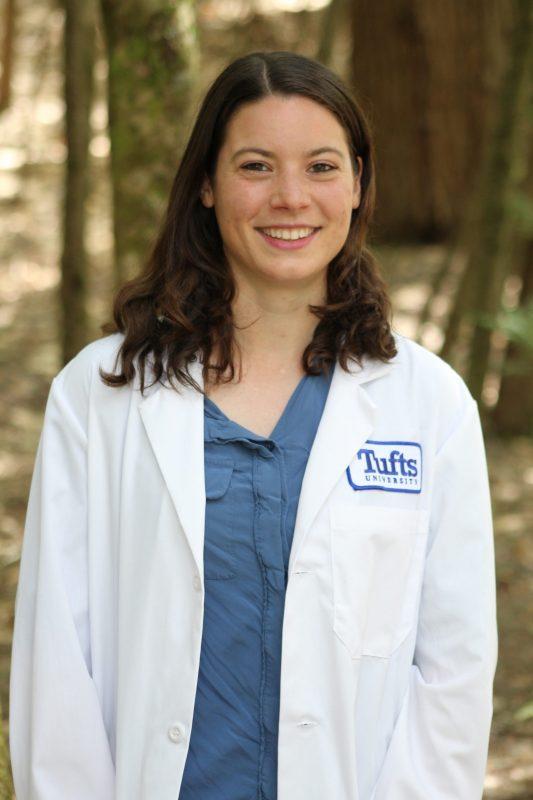-
About
- Leadership & Faculty
- News & Events
-
Academics
- Graduate
- Advanced Clinical Training
- Continuing Education
-
Student Life
-
Research
-
Hospitals & Clinics
- Emergency Care
- Hospital Services
-
Community Outreach
- Volunteer
Falling in Love with a Flock of Sheep Inspired Veterinary Student’s New Path
Rachel Prestigiacomo always knew she wanted to be a veterinarian, but never imagined she would pursue large animal medicine.

Rachel Prestigiacomo always knew she wanted to be a veterinarian. Her dad was allergic to dogs and cats, so she didn’t have many pets of her own growing up. But the neighbor’s dog, Sandy, stole her young heart.
“You could hang yourself over the fence and throw the ball and she would bring it back,” Prestigiacomo recalls. When she saw Sandy getting ready for a car ride one day and asked where she was headed, her parents explained that pets go to the vet—a “dog doctor,” in Sandy’s case.
“I thought, ‘that’s the job for me.’ From that point on, I never really walked away from veterinary medicine,” Prestigiacomo says. “Every choice I’ve made, essentially from the time I was little to now, was in service to veterinary medicine.”
Prestigiacomo is graduating from the Cummings School of Veterinary Medicine at Tufts University this year with her Doctor of Veterinary Medicine degree. Growing up in New Jersey and having been inspired to become a vet by Sandy the dog, she always assumed she’d make her career in private practice, caring for typical household pets. That was the plan, until her second year of vet school when she fell in love with a flock of sheep.
At the Tufts Farm, a 60-acre property along the town line of Westborough and Grafton, Massachusetts, there is a flock of Jacob sheep that are used for research. Some Jacob sheep are born with an ailment called Tay-Sachs disease, a neurodegenerative disorder that is fatal 100 percent of the time. Humans can also be afflicted by Tay-Sachs, and the disease presents itself similarly in both people and Jacob sheep, making the sheep an ideal large animal model to study the disease. Dr. Heather Gray-Edwards, a University of Massachusetts researcher and veterinarian, uses the sheep in her work to develop a type of gene therapy that may one day stop the progression of Tay-Sachs disease, Prestigiacomo explains.
As a Tufts Farm student employee, Prestigiacomo spent a lot of her time caring for these sheep—feeding them, removing horns from the babies, and performing neurological exams. Her job also entailed general farm labor and maintenance, such as mending fences or tending to the other animals, including pigs, chickens, and cows.
After her experience working with the Jacob flock, Prestigiacomo was hooked on sheep.
“The sheep are absolutely wild, and I love them as a species,” Prestigiacomo says. During her last semester at Cummings, she landed an external elective working at the USDA Sheep Experiment Station near Dubois, Idaho, a research facility that houses more than 3,000 sheep.
“My job was to walk the pens every morning. If I see a problem, I catch the sheep and fix the problem as best as I can under the guidance of Dr. Jenni Dike, an incredible vet at the facility,” Prestigiacomo says.
Now nearing the end of her program, Prestigiacomo is on clinical rotations in the Hospital for Large Animals. She’s had the opportunity to spend time in all different specialty areas of both the large and small animal hospitals, including radiology, emergency and critical care, surgery, internal medicine, and anesthesia. Next year, Prestigiacomo will complete an internship with the Tufts Veterinary Field Service, continuing to care for sheep and other production animals she loves.
As her journey in veterinary school comes to a close, Prestigiacomo recalls some of the most impactful moments and experiences she’s had.
“The feeling you get the end of second year—at that point, you know a lot, but you don’t know the full story to anything,” Prestigiacomo says. Knowing all the ways an animal can suffer without yet knowing how to provide care can be overwhelming, she explains. Her advice for current students?
“If you keep putting one foot in front of the other, you find something that keeps you whole. For me it was the sheep,” Prestigiacomo says. “For anyone who is in vet school, wake up every day, do your best, and when it gets too hard, find that thing that saves you. It’ll be somewhere in your community.”
Department:
DVM Program